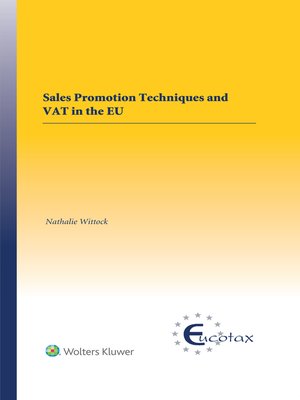Sales Promotion Techniques and VAT in the EU
ebook ∣ EUCOTAX Series on European Taxation
By Nathalie Wittock

Sign up to save your library
With an OverDrive account, you can save your favorite libraries for at-a-glance information about availability. Find out more about OverDrive accounts.
Find this title in Libby, the library reading app by OverDrive.



Search for a digital library with this title
Title found at these libraries:
| Library Name | Distance |
|---|---|
| Loading... |
Sales promotion techniques, or SPTs, are a common facet of consumer life, with many companies offering price reductions, bonuses, or other deals in order to attract or retain customers. Although VAT on advertising costs is in principle fully deductible, problems frequently arise when products are supplied as part of a sales promotion. This book provides the first in-depth investigation of the extent to which the current VAT treatment in the EU of the various SPTs corresponds to the core properties of the VAT, with particular attention to the so-called neutrality principle.
With nuanced precision, the author catalogs the SPTs commonly used in practice. Then, revealing serious inconsistencies among the relevant rulings of the European Court of Justice, she goes on to propose specific amendments to the VAT Directive. Focusing on the importance for VAT of determining the presence of an SPT, she thoroughly analyzes such aspects of the VAT–SPT relationship as the following:
The research is conducted mainly through a review of European legislation, policy documents, and CJEU case law and the Belgian interpretation thereof. Where room is left for different interpretations, some viewpoints of EU VAT in the Netherlands and the United Kingdom, as well as in the corresponding system of New Zealand, are considered.
With the finely tuned analysis presented in this book, practitioners can ensure an appropriate argumentation on the VAT treatment of SPTs with national tax authorities or before courts. As the first overall study on the VAT treatment of SPTs, clearly discussing the issues and legislative gaps and making concrete suggestions for future legislation, it is sure to be welcomed also by academics and EU policymakers.







